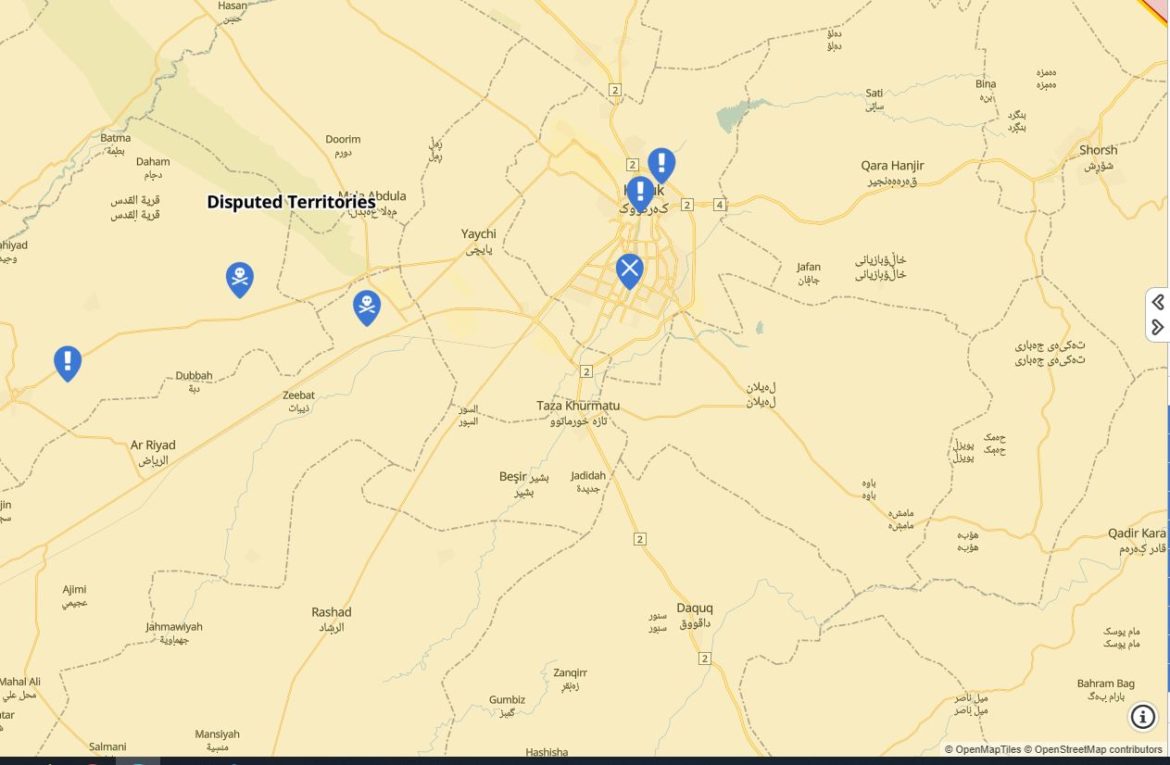990
A weekly brief of events and news occurred in the disputed territories.
Kirkuk
- On June 16, the Security Media Cell announced the arrest of two ISIS (Da’esh) terrorists, including a high-ranking member known as the “Minister of War” within the terrorist organization. Meanwhile, on June 11, a search operation in the Multaqa district uncovered a field containing 12 bombs intended to target security forces. In a separate incident near the same area, three soldiers were killed and four others wounded in an attack on a checkpoint belonging to the 32nd Brigade of the 8th Division of the Iraqi army on June 10. Da’esh terrorists have escalated their attacks in the past week, particularly in the vicinity of the Hawija district.
- On June 11, the National Security Agency revealed that drug trafficking had taken place at two private gas stations in Kirkuk. During raids on these stations, prohibited weapons, counterfeit stamps, and drugs were seized. The statement also mentioned the confiscation of 20 fuel tankers that were prepared for smuggling.
- On June 11, residents of the Asra and Mafqudin neighborhoods, who are predominantly Kakai Kurds, held demonstrations against the decision to demolish their houses. Over 1,000 houses, inhabited by Kakai Kurds, are at risk of being demolished due to the cornice double-sided project. These residents had previously fled their villages in the Daquq district due to threats from Da’esh and now face the prospect of a second displacement.
- On June 12, the Iraqi parliament approved the three-year budget law covering 2023, 2024, and 2025. Notably, the law did not include the transfer of Kurdish education posts in the disputed territories to federal employment. The current Iraqi government had pledged to transfer Kurdish teachers in Kirkuk from the Kurdistan Region Government’s (KRG) employment to the federal government, but it failed to fulfill this commitment. According to language laws, the government is obligated to provide education in the mother tongue for ethnic groups residing in the country. While the Iraqi government has offered mother tongue education for Arabs, Turkmen, and Assyrians in the disputed territories over the past 20 years, Kurdish education has not received the same attention. The Kurdish teachers in Kirkuk, numbering around 7,425 out of a total of 14,000 Kurdish teachers and employees, are currently paid by the KRG but administered by Baghdad. In response to the omission of a provision to transfer the salaries of Kurdish teachers to Baghdad, teachers held a demonstration in front of the Iraqi parliament office in Kirkuk on June 14.
- On June 10, the United Arab Coalition released a statement expressing concerns about certain “personal initiatives” that they perceive as attempts to undermine efforts to form a broad Arab front for the upcoming Kirkuk provincial council elections. Three days later, several Arab parties formed a new coalition in Kirkuk called the “Arab Glory” coalition, which included prominent figures such as former Iraqi lawmaker Omar Juburi and Ahmad Abdullah Juburi, the brother of Sahira Gharb, the current Arab lawmaker.
Khanaqin
- On June 14, Kurdish teachers in Khanaqin set up tents in front of the Khanaqin Education Department and initiated a strike. This action was taken in response to the Iraqi parliament’s exclusion of the transfer of Kurdish teachers in the disputed territories in the Iraqi budget law. The strikers have stated that they will continue their strike until Decision No. 21 of 2022, which pertains to the transfer of Kurdish teachers’ salaries to Baghdad, is implemented.
Makhmour
- On June 15, the Kurdistan Peshmerga Ministry announced a search operation in the slopes of Mount Karachugh, targeting areas suspected of hosting terrorist bases and shelters. The operation, led by the 14th Infantry Brigade of the Peshmerga Ministry, commenced at 5 am. It covered several villages including Gawr, Kendal, Gurda Shin, Malakagha, and Kabank Rash on Mount Karachugh.
Shingal (Sinjar)
- On June 14, Samia Smo, a Yazidi girl who had been kidnapped by Da’esh terrorists, remarried her husband, Dakhil Hassan. Both individuals are from the Sinjar district. Samia was held captive for a year before being rescued, and throughout that time, her husband Dakhil patiently waited for her return for a remarkable period of nine years. Dakhil’s unwavering devotion to his wife, Samia, has garnered significant public sympathy and support on social media. On another note, the Ministry of Displacement and Migration announced on June 13 that 440 displaced Yazidis from Sinjar, who had been residing in the Sharya Camp in Duhok, were returning to their hometown of Shingal. These families constitute the second group of Yazidis returning to their homes, as facilitated by the Ministry’s efforts.

